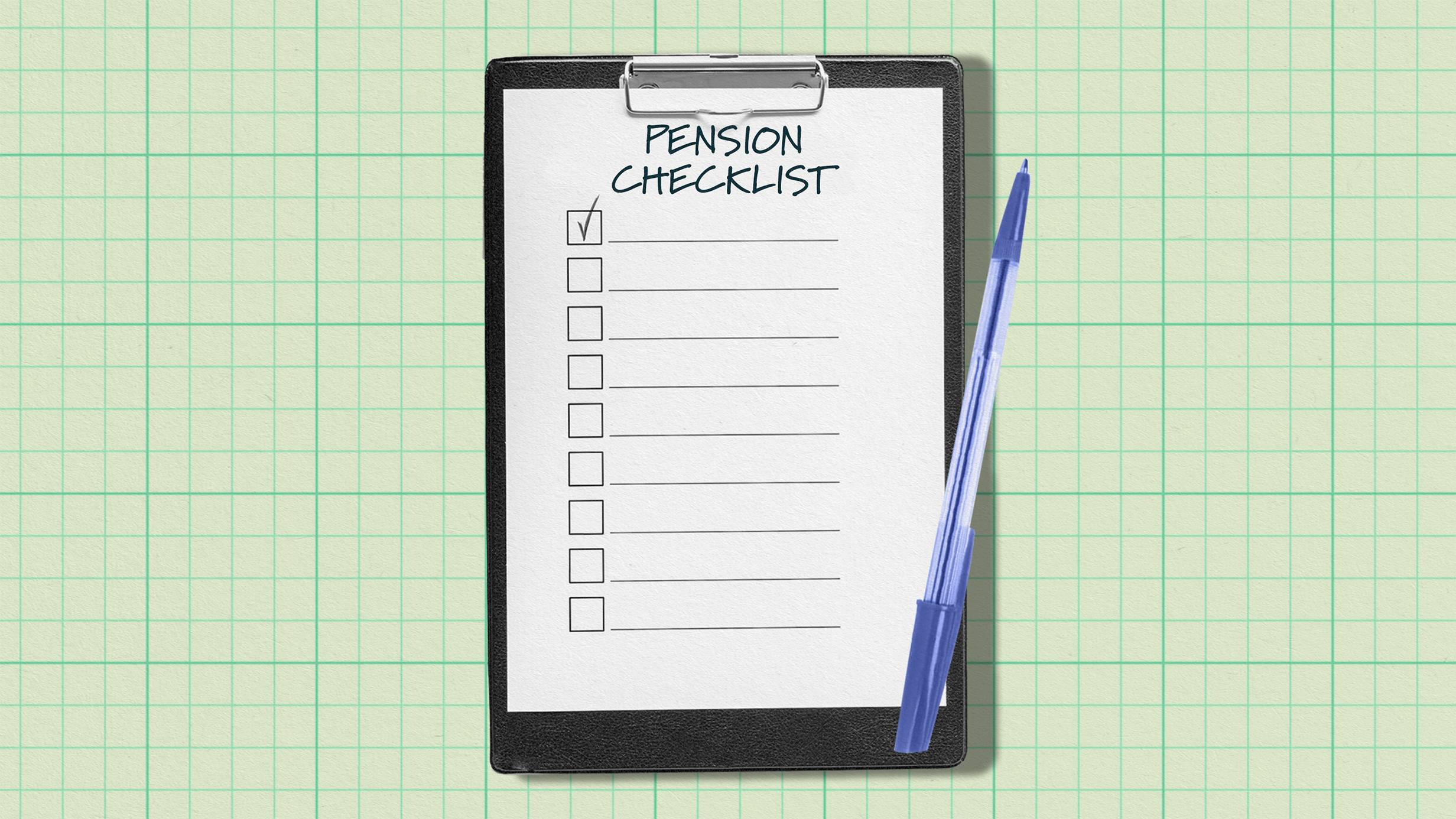Your pension success checklist
A 5 minute read

We all need a helping hand in life, so we’ve put together a handy list of pension questions to ask yourself that’ll put you in the driver’s seat with your retirement.
1. How much am I paying in?
This may seem like a simple question, but many people don’t know how much they’re contributing to their pension, or that their employer contributes some money too.
Most of us with a workplace pension will have what’s called a ‘defined contribution’ pension. This means the amount of money you have in your pot depends on how much has been paid in and how your investments have performed.
For defined contribution pensions, the minimum amount you have to pay in is 8% of your salary. This is made up of a 5% contribution from you and a 3% contribution from your employer. But that’s the minimum. How much are you paying in? Could you afford to pay in a little more?
A lot of employers will pay in more than the minimum and many may match or even double your contributions – so make sure you get as much in your pot as you can. The more, the merrier, they say.
If you have a ‘defined benefit’ pension - often called ‘final salary’ or ‘career average’. Your employer pays you a guaranteed income for life in retirement, and its value is determined by how long you’ve been a member of the employer’s scheme and the salary you’ve earned when you leave or retire.
2. Have I lost or forgotten about a pension?
Somewhere out there, in the eternal and infinite cosmos, or a small desk drawer (the one at the top that’s usually reserved for the things too insignificant and important), is a pension. Or at least the details of one.
Maybe you’ve misplaced them. The name of the provider, or the pension account number.
Well, don’t beat yourself up. It’s easier and more common to lose a pension than you may think. The Association of British Insurers (ABI) say there’s around £26 billion* to be claimed from lost pensions.
That’s why it’s more important than ever to track those old pensions down. Even a few of those small and forgotten pension pots can add up and make a big difference to your savings.
So where to start? It all depends on how much you already know about your lost pension. Every pension provider is obliged to send you an annual statement, so it’s worth going through the dark corners of your house to find that old paperwork you’ve stuffed away.
If you can find out the name of your pension provider, get in touch with them directly. If you don’t know the name of your pension provider, try getting in contact with your previous employer and let them know when you worked there. They may be able to help and give you your pension provider’s details, so that you can get in touch with them.
If you don’t have any of this information, don’t worry - all is not lost. The government has a free service called The Pension Tracing Service, which can help. By using their website you can enter the name of your former employer and receive contact details to hopefully reunite you with your lost savings. You can also access the service by phone.
3. How much pension will I need?
Not an easy question to answer, but we’ve got some handy tips to help.
A good way to work out how much you may need is to jot down all your expenditures now and use this as a guide to create a plan for how much you will need in the future.
Group your expenses into different categories, like the essentials, subscriptions, travel. All that kind of stuff.
The essentials will include things like your mortgage, rent, utilities and food. Bear in mind, when you get to retirement, some of these costs may go down, or you may not need to pay out for some of them anymore. For example, you may be mortgage free, or you may not spend as much on commuting if you’re no longer working.
Once you’ve worked out your everyday expenses, you can start to factor in the fun things you want to do in retirement – things like holidays, trips, and treats. Ask yourself, are you on course for a retirement that covers all your needs?
One great step to working out a picture-perfect pension is to use the Retirement Living Standards as a barometer. The Retirement Living Standards provides a rough guide for what income you may need to attain various standards of living for both single people and couples.
4. How much State Pension will I get?
Your State Pension is an important part of your future planning, so make sure to get a State Pension forecast and check your State Pension age.
Everyone is entitled to the State Pension, but not everyone qualifies. You’ll get some State Pension if you’ve made at least 10 qualifying years of National Insurance contributions or received National Insurance credits.
You need 35 qualifying years to get the full New State Pension amount, which is currently £203.85 a week for the 2023-2024 tax year.
Your forecast will be able to tell you how much you’re on track to receive.
5. Is my pension invested in the right funds for me?
We all have a kind or cash compass that dictates our approach to investing. Safer, riskier, ethical… there’s a lot to consider.
Unless you don’t want to consider it. Or never have. If that’s you, then your defined contribution pension is probably sitting in your workplace pension’s default investment option. That’s the one you’re automatically put into if you don’t choose anything else.
These kinds of funds aim to satisfy the many, not the few. They take a ‘one size fits all’ approach – which isn’t a bad thing, but it means that your money may not be working as hard as it could be.
You can choose and manage your own funds, and this may be better suited to you, so it’s definitely worth reviewing all the options available and to consider which might be most appropriate for you.
It’s easy to look into your pension investments. Your employer or pension provider will be able to help, or you can check via your online pension account.
6. What are my pension charges?
All pension providers charge a small fee for looking after your money – and these will be different depending on the provider. These fees are usually called an Annual Management Charge or Servicing Charge. Over time, fees and charges can make a huge difference to your returns, so make sure you understand exactly how much your pension costs.
If you’re thinking of combining any of your pension pots, make sure you compare the charges between the different providers to ensure you’re getting the best deal.
7. Am I accidentally leaving my pension to an ex?
You can’t usually leave pension savings in your will, so you need to make sure you have nominated who you would like to receive your pension if you die. This lets the Trustees know (those responsible for making sure that a pension scheme is run properly) about how you want your savings shared.
You can choose family members or close friends (and it can be more than one person), but make sure you keep details of your beneficiaries up to date.
Usually, the Trustees will follow your explicit instructions, but if you don’t name anyone it may be up to the discretion of the trustees as to whom the value of your pot is paid. If your form is out of date, your savings could end up going to someone you’d rather they didn’t!
You should be able to nominate a beneficiary via a form from your pension provider. If you’re not sure where to find the form, ask someone from your HR or pension team.
8. How can I take my pension money?
Life’s milestones often come with big financial decisions and taking your pension money is probably one of the biggest. Before you reach retirement, you’ll need to do some homework around how you can take your defined contribution pension:
You can normally access your pension from the age of 55 (or age 57 from 2028) – and you don't have to stop work to begin taking it.
Whatever way you choose to take your money, you’ll usually be able to take 25% of your pension pot as a tax-free lump sum.
One way of taking your pension money is as a guaranteed income for the rest of your life, for as long as you live. This is called an annuity and you’ll need to buy one of these from an insurance company.
Another way is to take your whole pot in one big go. Sounds tempting, right? But you’ll need to be mindful of the taxman (don’t ask him what he wants it for) and you’ll need to budget your money carefully otherwise you could run out.
Finally, you can take your money little by little. If you decide to walk down this road, there are a couple of ways to do it: ‘Flexi-access drawdown’ or taking an ‘Uncrystallised funds pension lump sum’.
Not all pension providers may offer you all these options, so you’ll need to check what options you have available to you.
If you have a defined benefit pension, you usually don’t need to make a decision over how to take your money. You’ll be paid a guaranteed income for life in retirement based on how long you’ve been a member of the employer’s scheme and the salary you’ve earned when you leave or retire.
You can usually begin taking your DB pension from the age of 60 or 65. But this could be different depending on your pension scheme’s rules.
9. Have I registered for an online pension account?
Welcome to the digital world! You’re gonna love it here. Probably because it’s easier for you to manage your pension and keep it in check. You might have to register for an online account – like you do with your regular bank account. This is usually pretty easy to do. Speak to your pension provider, or HR team to get set up online.
10. Have I made use of the free services available?
The Government has a free and impartial service available called Pension Wise. If you’re over 50, you’re entitled to a free session with their friendly experts to discuss the various options you have to access your pension.
There’s also lots of really helpful money and pension resources available on the MoneyHelper website.
Our top tip – make use of the free guidance available before you do anything with your pension – and if you feel like you need more personalised support before making any decisions, take independent financial advice. MoneyHelper can also help you to find an independent adviser.
DO NOT EDIT THIS BOX UNLESS YOU'RE NOEL

